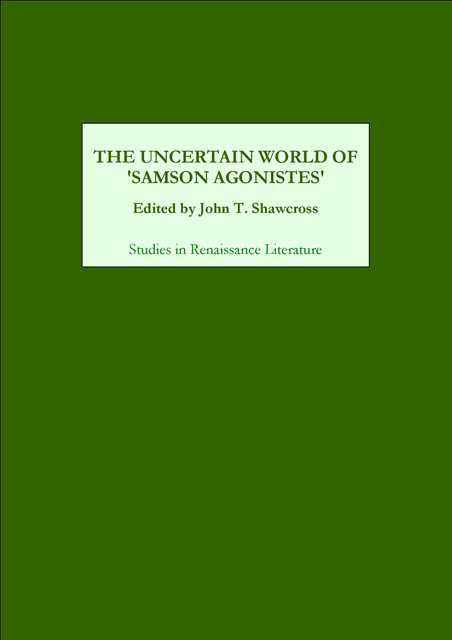Book contents
- Frontmatter
- Contents
- Preface
- Chapter 1 The World of Samson Agonistes
- Chapter 2 Uncertainty and the Text
- Chapter 3 The Dramatic Work and its Reading
- Chapter 4 Samson: God’s Champion, a Type, or Individual?
- Chapter 5 Dalila: Seductress or Wife?
- Chapter 6 Politics in the Destabilized Text
- Chapter 7 Biographical Intrusions
- Chapter 8 The Uncertainties of Irony
- Chapter 9 A Hermeneutics of the Text
- Chapter 10 Samson Agonistes and Consistencies of Belief
- Works Cited
- Index
Preface
Published online by Cambridge University Press: 22 March 2023
- Frontmatter
- Contents
- Preface
- Chapter 1 The World of Samson Agonistes
- Chapter 2 Uncertainty and the Text
- Chapter 3 The Dramatic Work and its Reading
- Chapter 4 Samson: God’s Champion, a Type, or Individual?
- Chapter 5 Dalila: Seductress or Wife?
- Chapter 6 Politics in the Destabilized Text
- Chapter 7 Biographical Intrusions
- Chapter 8 The Uncertainties of Irony
- Chapter 9 A Hermeneutics of the Text
- Chapter 10 Samson Agonistes and Consistencies of Belief
- Works Cited
- Index
Summary
John Milton’s dramatic poem Samson Agonistes has long been a favorite work of many people, and has long been read as simply a version of the story of Samson in the Bible and its author’s “last” view of his world, now blind and victim of domestic and political strife. Its “strange” prosody seen in terms of English syllabic verse, its Hebraic origin in Greek form with Christian import, its alleged figuration of a Christ figure, its relationship with its first publication’s companion poem Paradise Regain’d (or lack thereof), its nonconformity to expected stage presentation have all evoked numerous critical statements since the mid-eighteenth century. In the last half of the twentieth century it has also been scrutinized as possibly not just a simple version of the confused Samson legend of the Bible, and Samson has been examined as not just a folk hero, positive of evaluation, but a negative figure to be rejected as exemplar. It has been speculated as earlier work in composition, or at least earlier in its first inspiration and partial writing, yielding perhaps an “unfinished” text. Biographical substance in any direct way has been rejected (and then reasserted). On one hand there is misogynistic Milton’s view of woman and the wrestlings with power structures in the patriarchal world of both gender and government. On the other there is some infrequent rebuttal through its presentation of a renovated woman and an ideal concept of marriage. Basic to many of these arguments is the assumption that the author is expressing his own beliefs and attitudes when Dalila and Samson’s relationship with her are introduced, yielding a masculinist Milton of the most extreme kind. In turn are provoked defenses of Milton through a reading of Dalila in positive terms and through argument of genderizations during his lifetime (which, indeed, continue in contemporary life). The dramatic poem has taken on political dimensions in the past and in the present.
My study of Milton and this text raises fundamental objections to the usual interpretations I hear and read: “biography,” prosody, the dates of composition and the reliability of text, the generic expectations, the figure of Samson and his seeming typology, the political philosophy which its author would read out of that text, and, most importantly for today’s critical world, the female/male questions that are raised and Milton’s attitude toward them.
- Type
- Chapter
- Information
- The Uncertain World of Samson Agonistes , pp. vii - ixPublisher: Boydell & BrewerPrint publication year: 2001

